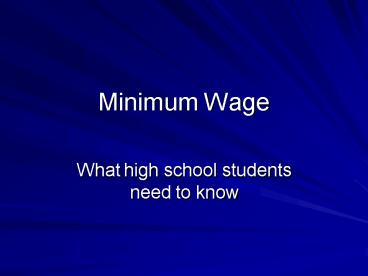Minimum Wage - PowerPoint PPT Presentation
1 / 22
Title:
Minimum Wage
Description:
... 1/4th of the average annual expense each month. Food $111.98. Housing ... Cost of food at home per month/ USDA. Single Male 20-50 years. Thrifty plan $141.10 ... – PowerPoint PPT presentation
Number of Views:2507
Avg rating:3.0/5.0
Title: Minimum Wage
1
Minimum Wage
- What high school students need to know
2
Planning on earning minimum wage?
- The facts on figures on minimum wage earners are
clear. - Full-time workers who earn 5.15 an hour, 40
hours a week, 52 weeks earn an income below the
poverty threshold.
3
More to the story? You bet.
- Most minimum wage earners are young and just
starting out. - Hopefully, as you progress in your career you can
earn more than minimum wage. - WATCH OUT THOUGH! Some people make career
choices which involve them earning minimum wage
or close to it for years and even an entire
career.
4
Characteristics of Minimum Wage Workers 2003
- 570,000 report earning exactly 5.15
- 1.6 million workers earn LESS than the minimum
wage - 2.2 million workers earning minimum wage or less
make up 3 of all hourly paid workers - Part-time workers were much more likely than
full-time workers to be paid 5.15
5
Who are minimum wage workers
- About ½ of all minimum wage workers are under 25
years old. - Twice as many women (as compared to men) earn
minimum wage - Never married workers are more likely than
married workers to earn minimum wage (they are
also quite young) - The lower your education the more likely it is
that you will earn minimum wage
6
Minimum Wage Earners
http//www.bls.gov/opub/ted/2003/dec/wk1/art03.htm
7
Real Purchasing Power of the Minimum Wage
8
10,712 A Year
- 5.15
- 40 hours/week
- 52 weeks/year
- Total 10,712/year
9
Single Person Qualifies For Government Transfers
when they earn
- Food Stamps 12,108/year
- http//www.fns.usda.gov/fsp/applicant_recipients/f
s_Res_Ben_Elig.htm - Low Income Energy Assistance (automatically
qualified in most states if Food Stamp qualified)
10
Whats wrong with qualifying for government
transfers?
- The short answer is, nothing. We have transfers
to help low-income people.
11
Whats wrong with qualifying for government
transfers?
- The long-answer is, everything. Government
transfers are possible only through taxation. It
is much preferable to have workers being able to
contribute to the system rather than drain from
the system. It is one thing to have the poor
to contend with it is another thing to have to
support the working poor with transfers.
12
How does the minimum wage workers lifestyle
compare?
- In addition to qualifying for government
transfers it is important to look at average U.S.
expenditures and compare them to those possible
with minimum wages. - The Consumer Expenditure Survey conducted the
U.S. Bureau of Labor conducts surveys to see how
Americans are spending their money. www.bls.gov
13
Average Annual Expenditures Consumer Expenditure
Survey
- Food 5,375
- Alcohol 376
- Housing 12,283
- Apparel 1,749
- Transportation 7,759
- Health Care 2,350
- Entertainment 2,079
- Personal Care 526
14
Average Annual Expenditures Consumer Expenditure
Survey
- Reading 139
- Education 752
- Tobacco 320
- Miscellaneous 792
- Cash Contributions 1,277
- Personal Insurance 3,899
- Annual Total 40, 677
15
If your annual income is 10, 712 and average
annual U.S. expenditures are 40,677 then you
will have approximately 1/4th of the average
income to use for expenditures
16
To live on roughly 1/4th of the average annual
expense each month
- Food 111.98
- Housing 276.72
- Includes utilities, housekeeping supplies, home
furnishings and equipment, household operations,
shelter - Transportation 161.65
- Includes car payments, repairs, gasoline
- Average gas expenditure 2002 102.92
17
To live on roughly 1/4th of the average income
per month (cont.)
- Health Care 43.32
- Includes premium, and out-of-pocket expenses.
With no benefits could you buy health insurance
for 43.32 a month? - Entertainment 43
- Apparel 36.44
18
Is it possible to live on 1/4th? Cost of food at
home per month/ USDA
- Single Male 20-50 years
- Thrifty plan 141.10
- Low-cost 183.00
- Moderate cost 227.90
- Liberal 277.90
- Single mom and 1 child (age 3-5) 225.30
- Minimum wage food estimate of 111.98
http//www.cnpp.usda.gov/FoodPlans/TFP99/TFP99Repo
rt.pdf
19
If a consumer needs to spend a higher percentage
of their budget on food and shelter what happens?
- No health insurance (very risky!)
- Cannot afford reliable transportation
- Skimping on other areas
- Clothing
- Heat
- Gifts
- Retirement
20
Consequences of living on minimum wage
- How could you support a family on minimum wage
if minimum wage will not support an individual? - Your life is fragile. One thing goes wrong
(i.e.,car repairs, health problems) and you will
need to rely on credit. - Psychological cost of living on the edge, relying
on government transfers, and working full-time.
21
Consequences of living on minimum wage
- You cannot build wealth for the future.
- You cannot build even a savings account for
emergencies. - You are victimized by alternative credit sources
such as pawn shops, rent-to-own, paycheck
lenders. - You may live a life of stress
22
Families on minimum wage
- Child care costs often take up a large portion of
a minimum wage. - The cost of child care often forces workers to
work more hours. - Then, the hours cause more need for child care.
- It can be a vicious cycle that takes away from
family time and resources.































